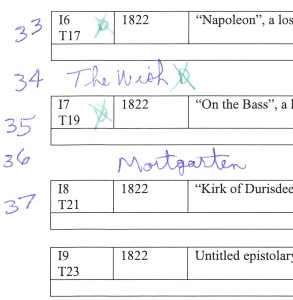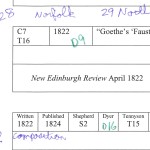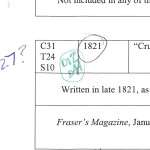M y time in the poetry wars, as I call the days I spent at Poem Kingdom, was my first time to begin to acquire what I recently termed an “editor’s eye”. At that site I critiqued hundreds of poems, first as a participant, later as a moderator and still later as an administrator. That actually wasn’t my first time and place to do that. I had already been critiquing at Sonnet Central for a few months, and had been in a writing critique group for a couple of years.
y time in the poetry wars, as I call the days I spent at Poem Kingdom, was my first time to begin to acquire what I recently termed an “editor’s eye”. At that site I critiqued hundreds of poems, first as a participant, later as a moderator and still later as an administrator. That actually wasn’t my first time and place to do that. I had already been critiquing at Sonnet Central for a few months, and had been in a writing critique group for a couple of years.
After Poem Kingdom there was Poem Train (with it’s critique forum Café Poetica), Poem 911 (which died in the whole EZ Boards hacking fiasco), and Absolute Write’s Poetry Critique Forum. In all of these I’d estimate that I critiqued somewhere around 1,000 poems. No, I don’t think I’m exaggerating. I copied off a bunch of them, but not all I’m sure, and have them in notebooks, preserved for posterity and research, should I become a famous author who someone ever wants to research.
 A thousand critiques at an average of perhaps 300 words each is 300,000 words. If anything I’m probably short with that. That’s a lot of time and effort given to critiquing. What I did was analyze the poem as a work-in-progress. Literary criticism—whatever that is exactly—was not the goal, but rather helping the poet bring the poem to a state of completion as the best poem possible for the subject matter and desires of the poet. In short, it was to be an editor. Not a cheerleader. Not a critic. But an editor.
A thousand critiques at an average of perhaps 300 words each is 300,000 words. If anything I’m probably short with that. That’s a lot of time and effort given to critiquing. What I did was analyze the poem as a work-in-progress. Literary criticism—whatever that is exactly—was not the goal, but rather helping the poet bring the poem to a state of completion as the best poem possible for the subject matter and desires of the poet. In short, it was to be an editor. Not a cheerleader. Not a critic. But an editor.
During the years, ever since around 1998, I’ve also been in writers critique groups in real life, and one time on-line. It was the same thing: look at works in progress and consider how they might be made better in the writer’s quest for publication. These weren’t written, or at least not type-written and posted for all the world to see. A handful of us sat around a table and marked manuscripts in pen/pencil and gave oral crits. Still, it was the same type of editing, it seems to me. Sometimes I was most concerned with what is essentially proofreading. At other times it was line edits: looking at grammar and sentence structure to see how the writer’s intent can be better communicated. Still other times it was structural edits. I remember critiquing one piece at an e-mail critique group where the woman described a character as timid. Then she had the girl go up to a fellow student she knew of but didn’t know and offer help to her. It was completely out of character. I pointed that out; I’d call it a structural edit. Still other times I’d do a big picture edit, such as is the plot interesting? Are there holes or conflicts in the plot? Those kinds of things. Different types of edits as the situation arose.
Now I’m editing my next publishing project, a book titled Thomas Carlyle’s Edinburgh Encyclopedia Articles. These are public domain articles that I found in five different places, plus a few notes that others have written about them (explanatory notes, not critique). I know I’ve written about this project before. These twenty-one articles have never been gathered before, so I decided to do so and add it to the Carlyle bibliography. I pulled the publisher’s note and editor’s introduction from the 1897 re-printing of sixteen of them, and pulled some references to them that Carlyle made in his own letters. But I knew I needed to write an introduction of my own. So I did. Last night I sent the much-critiqued Intro to my critique group, which meets next Tuesday. We’ll see what they say.
 But I’ve had other things to do as well, things that an editor would do. Such trivial things as deciding how much info to give about each article. How the text should appear on the page. Whether to break up long paragraphs (I didn’t), whether to modernize archaic punctuation techniques (I did). How to make lists and tables work best in modern typesetting and e-book formats. I suppose some of this is book production, but it feels like editing to me.
But I’ve had other things to do as well, things that an editor would do. Such trivial things as deciding how much info to give about each article. How the text should appear on the page. Whether to break up long paragraphs (I didn’t), whether to modernize archaic punctuation techniques (I did). How to make lists and tables work best in modern typesetting and e-book formats. I suppose some of this is book production, but it feels like editing to me.
So through all of this I’ve been acquiring my editor’s eye. They (that is, various experts and claimed-to-be experts) advise that one who self publishes should hire an editor before ever publishing their works. I think that’s good advice, in general, but a very expensive practice. Simple line editing for an average length probably costs $300 dollars. Add proofreading, structural edit, and big picture edit, and you will have a large editing bill. I don’t know about others, but I don’t have $500 or $1000 to pay for editing. Therefore I just have to do the best job of producing the book with the skills I have.
So maybe all my editing work through the years, even that from before I realized I was editing, is helping me with my self publishing. I’d like to think so.
:)I hope you win the war, and gain the eye.